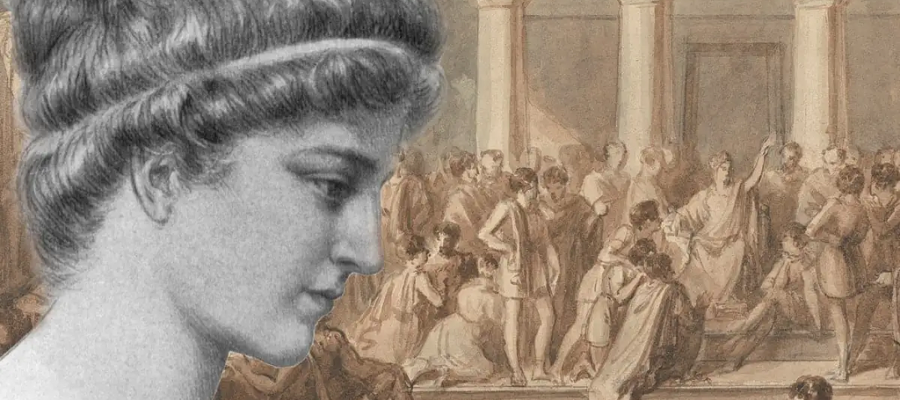In her time—the 4th century CE—Hypatia was one of the most famous philosophers in Alexandria, and indeed in the ancient world. She studied and taught mathematics, astronomy, and philosophy; under her leadership, the Alexandrian School was highly prestigious, right up there with the Academy of Athens. Students came from far and wide, and from a variety of faith traditions: some were Christians, some Jews, and some Pagans like Hypatia herself.
Hypatia was a Neo-Platonist. Drawing on Plotinus and others, Hypatia taught her students about a purely intellectual divine force at the heart of the universe, termed “the One”; by living lives of contemplation, Hypatia believed, we could bring ourselves closer to this origin of all our souls.
This version of Neo-Platonism wasn’t particularly offensive to early Christians; in fact, most of her students were Christians, and one of them, Synesius, even wrote a series of hymns that seemed to bring together Neo-Platonism and Christianity. Synesius described the divine as having three different aspects—one heavenly, one angelic, and one earthly—just like the Christian trinity.
It's true that there was a rival branch of Neo-Platonism which emphasized rituals, including animal sacrifice, and for obvious reasons, Christians drew the line at sacrificing an animal to pagan gods. But Hypatia’s version of Neo-Platonism was less about rituals and more about cultivating virtues, the kind that allow you to transcend the physical and experience the One.
This background makes her death, at the hands of extremist Christians, all the more tragic. Cyril, the bishop of Alexandria, who wanted to take down the Roman governor Orestes. Since Hypatia was a friend and advisor to Orestes, and was powerful, Cyril decided to spread vicious rumors about her; these rumors eventually got her killed.
Hypatia’s legacy lives on, however. She was a powerful intellectual figure; she had a unified philosophical system; she ran one of the most prestigious schools in the ancient world; and she accomplished all that as a woman in a male-dominated field. She’s remained an inspiration to female philosophers throughout the ages. (There’s a journal named after her—and even a recent movie based on her life!)
Hypatia wasn’t entirely alone, of course, in the ancient world: there were other prominent female philosophers at this point in history, including Pandrosion of Alexandria, Sosipatra of Pergamon, and Asclepigenia of Athens. But these philosophers have never been given the same attention as their male counterparts. In spite of the movie, Hypatia is still not a household name like Plato or Aristotle—which is exactly why we’re doing this series on Wise Women. We’ll be celebrating sixteen unsung heroines of philosophy, from Hypatia in the 4th century to Judith Jarvis-Thompson in the 20th and 21st. Their philosophy has sometimes been overlooked and often under-rated—but not around here!

Comments (4)
Natalie Jones
Sunday, August 13, 2023 -- 9:55 PM
It is refreshing to discoverIt is refreshing to discover that there are female philosophers, particularly from the period of Hypatia. It is tragic that she was put to death.
Tim Smith
Monday, August 14, 2023 -- 5:36 AM
There is more than I thoughtThere is more than I thought in extent material on Hypatia, as related in the show. This was helpful and enlightening. I feel differently than I did even last year. I don't know if that is age or learning, or both. Juana Inés de la Cruz was a revelation. This is appreciation, if not wisdom. An auspicious start to what is shaping up to be an essential series in shaping my views on gender and philosophy. I don't think Hypatia's martyrdom is due to her gender, which is a more profound thought for later times.
Daniel
Friday, August 18, 2023 -- 2:06 PM
Because philosophical importBecause philosophical import can with some justification be co-joined with characteristic imperviousness which resists recognitive encountering of any non-imposed distinctions between hapless surface-withdrawal and reckless subcutaneous unstimulated distance-sense assumptions, your use of the term "essential" as modifying a self-referential view-shape productivity expressed in linear form as a "series" becomes singularly problematic. Is the essence of the series mathematical?
cobybrian
Monday, December 4, 2023 -- 6:54 PM
In the 4th century CE,In the 4th century CE, Hypatia emerged as a luminary philosopher in Alexandria, captivating minds with her teachings on mathematics, astronomy, and philosophy rooted in Neo-Platonism. Her illustrious leadership at the Alexandrian School attracted a diverse array of students, including Christians, Jews, and Pagans. Hypatia's Neo-Platonism, centered around a purely intellectual divine force termed "the One," harmoniously coexisted with early Christian beliefs. Unlike the ritualistic strand of Neo-Platonism, Hypatia's emphasis lay in cultivating virtues to transcend the physical and connect with the cosmic origin. In the modern era, contemplating the philosophical realms of figures like Hypatia feels akin to playing fate/grand order on pc—an immersive exploration of historical narratives and intellectual legacies.
https://games.lol/paint-by-number-coloring-book-color-by-number/